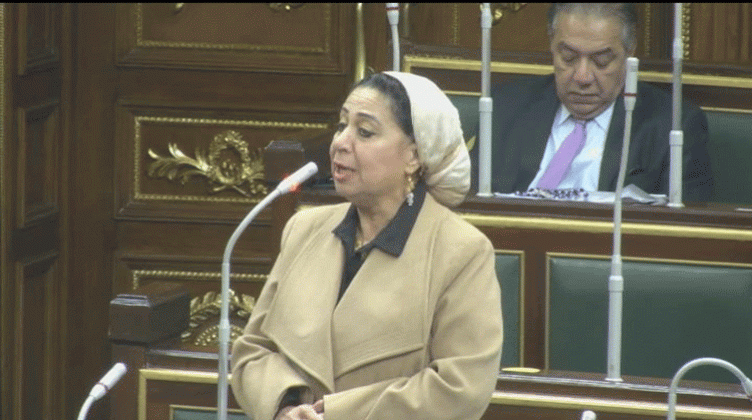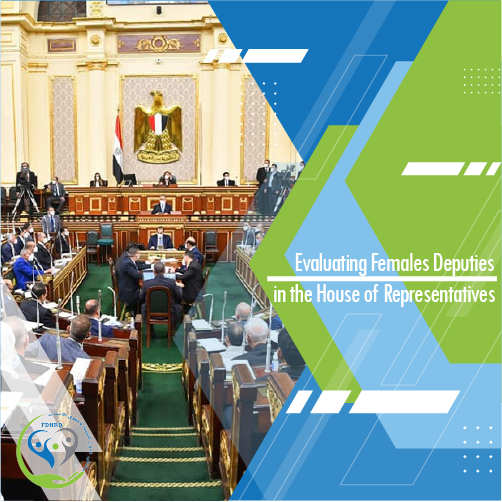Press release
—————————————————————-
On Saturday, April 10, 2021, The Forum for Development and Human Rights Dialogue issued a policy paper on “Evaluating the Performance of Women Deputies in the House of Representatives” (analytical study by applying to the first 30 sessions of parliament) held by the House of Representatives from January 12, 2021 (opening session) to March 14, 2021 (30th session).
The policy paper confirmed that the unprecedented number of women deputies in the House of Representatives in total (165) represents a historic opportunity to change the mental image hostile to women’s empowerment, which refuses to recognize the competence and ability to provide a typical parliamentary performance that exceeds what many male deputies offer and benefits Egyptian women by amending and developing legislative packages restricting women’s participation in public work (especially) and that the current parliamentary and numerical performance is a direct reflection of the support and support of the Presidential Foundation for Women and their roles. Supporting and historical all national processes aimed at developing state institutions and restoring them from attempts at hegemony that was tried by a dark current that wanted to dominate their capabilities in addition to unprecedented participation in all electoral processes aimed at amending the constitutional text or reconstituting parliaments.
The paper has observed several observations, the most important of which were:
- There is the diversity and spread of the membership of women deputies among all political parties and forces, starting with the Future of The Homeland Party, which has a parliamentary majority, which issues the representation of women with 65 deputies representing (39.39%) of the total membership of women deputies in the Council, followed by independents with 25 deputies, then the Republican people (21) and the delegation (14). While the lower representation of women deputies was the share of the two parties (justice will of a generation) with a number of deputies (one) for each of them and of all parliamentary parties, the Nour party was unique in being the only political organization whose parliamentary body was devoid of representation of women deputies as an expression of an intellectual and ideological impasse hostile to women and refusing to hold public office.
- The opening session carried many negative indicators indicating the absence of female deputies from the scene and the circle of interest of the parliamentary decision at the organizational level related to the holding of elections on the seat of the president and the two agents, so the committee proposed by Mp Farida Al-Shobashi to oversee the elections of the Speaker of the Council of Representatives was absent from the presence of any female member of parliament, which was repeated in the formation of the committee announced by Chancellor Hanafi Jabali (Speaker of the Council) to oversee the elections of the agent These negative aspects of the election process itself, in which women are represented less than they deserve or possessed of capabilities, have moved with the announcement of the opening of the door to run for the presidency of the Council. The absence and absence of any female candidates appeared in the competition, which shows the absence of a spirit of adventure and the continued sense of inability to carry out the functions of leader (the first) of the members of the Council, even if the candidacy is honorable or to establish the idea of equality and competitiveness. Also, despite the qualitative change in the competition for the two proxy seats, which saw the presence of (3) female deputies to compete among (8) candidates (Farida Al-Shobashi Sahar Bashir Matouk Hanan Abdel Moneim Awad) by 37.5%, the results of the vote showed a severe weakness in the number of votes they received (71 5 6) respectively with a total (82) votes despite the fact that the deputies alone had a number (324) vote.
- The national decision witnessed a great development in the direction of supporting women, starting with the activation of the constitutional text amended article (102) by allocating at least (25%) of the total seats of the Council in addition to the number (half) of the appointees, which was digitally transformed to represent women by the number of (163) deputies who joined two deputies to the Council later They were divided between (24) quality committees, the largest of which was in terms of the size of the presence, the health committee with 20 deputies, followed by culture and media (18), solidarity (17), foreign affairs (15) and education (15) while the only committee that was free of the presence of women deputies was (transport and transportation).
- The representation of women deputies in the general committee was limited to (two deputies) by (5.2%) because they hold the presidency of two committees of qualitative committees, Draya Sharaf al-Din (Culture and Media) and Nora Ali Abdel Samae (Tourism) in an unacceptable indicator of limited representation and poor presence in one of the most important organs of parliament and its tools for formulating public policy for its various practices.
- The plenary session No. (12) on January 24, 2021, approved the proposal to form a values committee submitted by the General Committee of the Council, including the number of (4) deputies in a percentage (33.33%) of the total membership of the committee in a decent level of representation compensates for the poor presence of women deputies in the General Committee and corresponds to the nature of the tasks and roles owned by the Values Committee.
- Digital monitoring of bills submitted by deputies and the plenary agreed to refer them to the competent committees for consideration and opinion clearly reveals the weakness and limitations of the legislative role of women deputies and the limited proposals they issue, including (26) proposals and a bill that was presented to me The plenary session was the share of the government (6) laws while the share of deputies (20) proposals only submitted two bills (two) only 7.7% of the proposed legislation was strange in them not to approach the issues of women or their suffering
- Through the initial 30 sessions of parliament, which lasted for 62 days from (January 12) until (March 14) 2021, women deputies participated in a total of (361) interactive interventions by female MPs during the plenary sessions distributed between (265) interactive interventions in the sessions of evaluation of government performance and the extent of The achievement in the implementation of the government program (2018: 2022) out of a total (1227) intervention made by members of parliament during the evaluation sessions by (21.6) in a figure despite its relative limitations compared to the number of women deputies in the Council, but the criteria of experience and precedents of parliamentary work represent a positive picture of the interaction of women deputies and their keenness to deal seriously with parliamentary work, especially in its supervisory aspect.
- Although 126 deputies participated and interacted during the opening sessions of the current session, the top and most important models among them were in favor of (38) deputies whose roles blended between legislative and supervisory, where they performed interactively in sessions dedicated to evaluating government performance and statement of position From the plans and programs applied within the government vision (2018: 2022) and also participated effectively and efficiently in the development of the bills before the Council and proposed alternative formulations of the texts of these laws to ensure higher efficiency of the text and in response to the objectives and objectives of the proposed legislation.
- Considering the performance of the deputies, we find among the members of the Council (39) a female deputy who applies to them the description of the Sphinx because they did not ask for the floor or participate in the interventions in full during the sessions of the Council (30) except for the swearing-in session in which the constitutional text of article (104) forced them to speak.
- Of the 165 deputies in the Parliament, 39 did not speak or use the Mayk during plenary sessions except in the swearing-in of the legal oath, compared to (126) deputies who participated interactively during the sessions between them (47) deputies who spoke once (only) and among them The deputies are (two deputies) who spoke in the legislative sessions only (Rehab Abdul Ghani Zainab Al-Salaimi) as opposed to (39) deputies who spoke in the oversight sessions (only) dedicated to the discussion about the statements of the ministers while the most positive and efficient performance in favor of (38) deputies distributed their interventions between censorship and legislation as a model worthy of appreciation and praise for the integrative role that the deputy of the people and his representative must provide.







